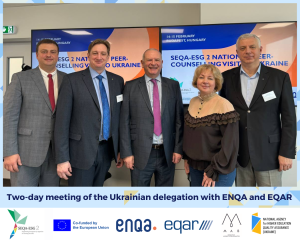On 14-15 February, a strategic meeting of the Ukrainian delegation and a large number of higher education stakeholders with the head representatives and experts of ENQA and EQAR took place in Budapest.
Andrii Butenko, Head of NAQA, made a welcoming speech, thanking the European colleagues for their support, recommendations and evaluation of the results of the implementation of the National Action Plan for External Quality Assurance for 2022-2023, and also our defenders, thanks to whom Ukraine is fighting and making great progress in various spheres of life every day. Valeria Csepe, President of the Hungarian Accreditation Committee (MAB), who hosted the meeting, welcomed the Ukrainian delegation as well.
The programme of the first part of the meeting was devoted to an introduction to the work of ENQA and EQAR, a presentation of the Ukrainian higher education system and the higher education quality assurance system. In their speeches, Douglas Blackstock, President of ENQA, and Magalie Soenen, Director of EQAR, praised the transparency and openness of NAQA, particularly in the context of broadcasting public parts of the meetings and active participation of stakeholders in the implementation of the National Action Plan.
Heli Mattisen, Director of the Estonian Quality Agency for Education (HAKA), Henning Schäfer, Managing Director of the German Agency (ZEvA) and member of the ENQA Appeals Committee, also joined the strategic meeting and discussions as experts.
Presenting Ukraine’s higher education system, Mychailo Wynnyckyj, Deputy Minister of Education and Science of Ukraine, told the participants about educational reforms and qualitative changes in the system since 2014. He emphasised that Ukrainian education is based on European values, especially in terms of openness and transparency, and described the realities in which the entire system is currently operating: 3798 educational institutions have been damaged by shelling and bombing since the full-scale invasion started, and 437 are beyond repair.
Nataliia Stukalo, Vice Head of NAQA, presented the peculiarities of the functioning of the external quality assurance system in Ukraine. She elaborated on the process of accreditation of study programmes, including the formation of expert panels and sectoral expert councils of NAQA:
“Here are some examples and figures that best reflect the qualitative changes in the quality assurance system. Today, each of the 31 sectoral expert councils includes representatives of employers and students. In total, we have 4424 experts in the register, including 3420 university professors, 888 students, and 116 international experts. In 2022-2023, NAQA made 7155 decisions on the accreditation of study programmes.”
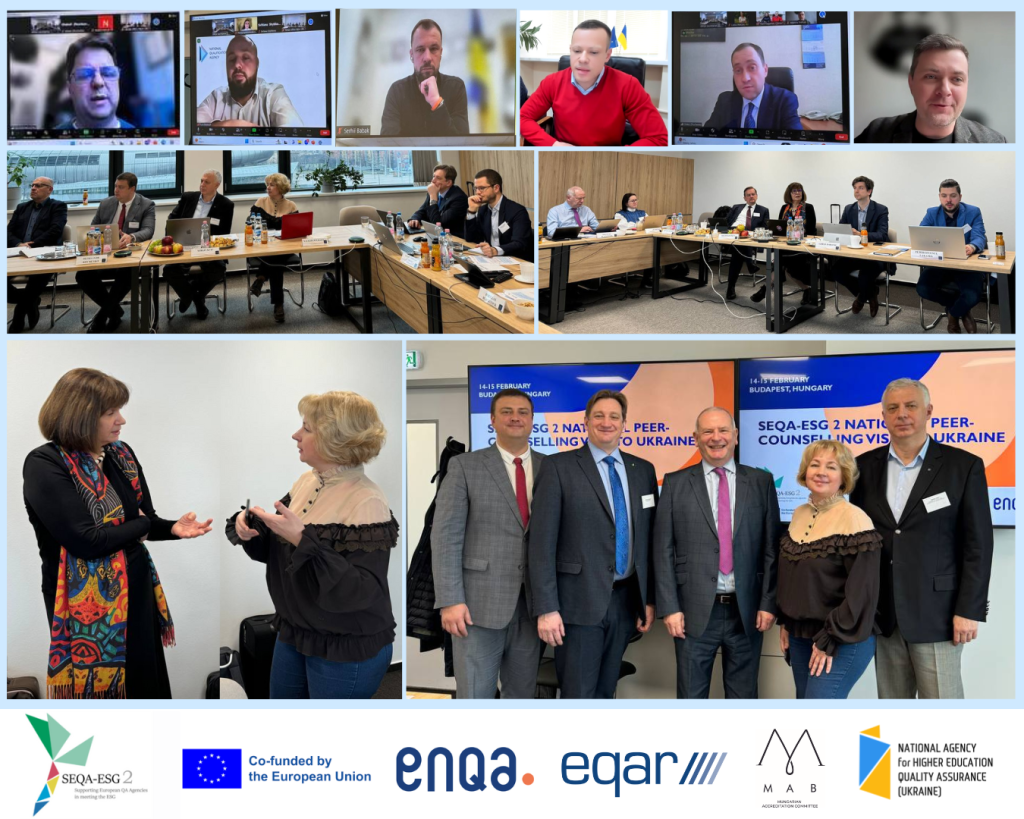
After that, Andrii Butenko presented a detailed analysis of the implementation of all measures of the National Action Plan – expectations and results in accordance with ESG 2015.
“NAQA, together with the Ministry of Education and Science of Ukraine, the Committee on Education, Science and Innovation is constantly working and improving the regulatory framework. Together with stakeholders in the field of higher education, we are implementing the standards and recommendations of ESG 2015 despite the challenges of today. I am sincerely grateful to all parties involved in this process: The Ministry of Education and Science and the relevant Parliamentary Committee, representatives of the National Qualifications Agency, universities, student organizations, trade unions and employers for their involvement, commitment and effectiveness,” – summed up Andrii Butenko.
In addition to the face-to-face meeting, stakeholders joined the meeting via video link to talk about their joint work on the National Plan, and noted the openness of NAQA and its desire to engage all stakeholders in qualitative changes.
In particular, Yuriy Balanyuk, Head of the National Qualifications Agency, spoke about the joint work on the National Qualifications Framework and its harmonisation with the European one, and about the consideration of professional standards in the training of specialists within study programmes. Oleksandr Yavorskyi, Head of Department at the Federation of Employers of Ukraine, noted that an important element of our cooperation is joint work on the approval of educational standards. In addition, the Federation’s representatives are members of NAQA and sectoral expert councils, and actively participate in working groups and round tables.
Volodymyr Mirnenko, Director of the Department of Military Education and Science of the Ministry of Defence of Ukraine, noted that today’s study programmes of higher military educational institutions are based on the implementation of NATO standards and each of them has accreditation experts through cooperation with NAQA. Andriy Peremyibida, Talent Acceleration Center Director at SoftServe, emphasised the effectiveness of joint work to improve the quality of IT training.
Svitlana Shytikova, National Erasmus+ Office in Ukraine Project Coordinator, reminded that Ukrainian universities have begun to create internal quality assurance systems based on the experience of EU universities within the Tempus and Erasmus+ projects: “The team of experts on higher education reform has been actively cooperating with NAQA since the first day and is ready to work closely in the future”.
The meeting was also joined by representatives of Ukrainian students: Polina Hombalevska, President of Ukrainian Association of Students, Kyrylo Demchenko, Member of The Supervisory Board of the Ukrainian Students’ League, Ukrainian Youth Delegate to the United Nations, and Maksym Svysenko, Chairman of the Congress of the Ukrainian Students’ League. They described the challenges faced by Ukrainian youth, including the transition to distance and hybrid learning formats due to the 2019 pandemic and the start of the full-scale invasion in 2022. They thanked NAQA for its cooperation and the opportunity to be involved in the expert panel and the HEA, for developing a culture of academic integrity and developing ethical standards in higher education.
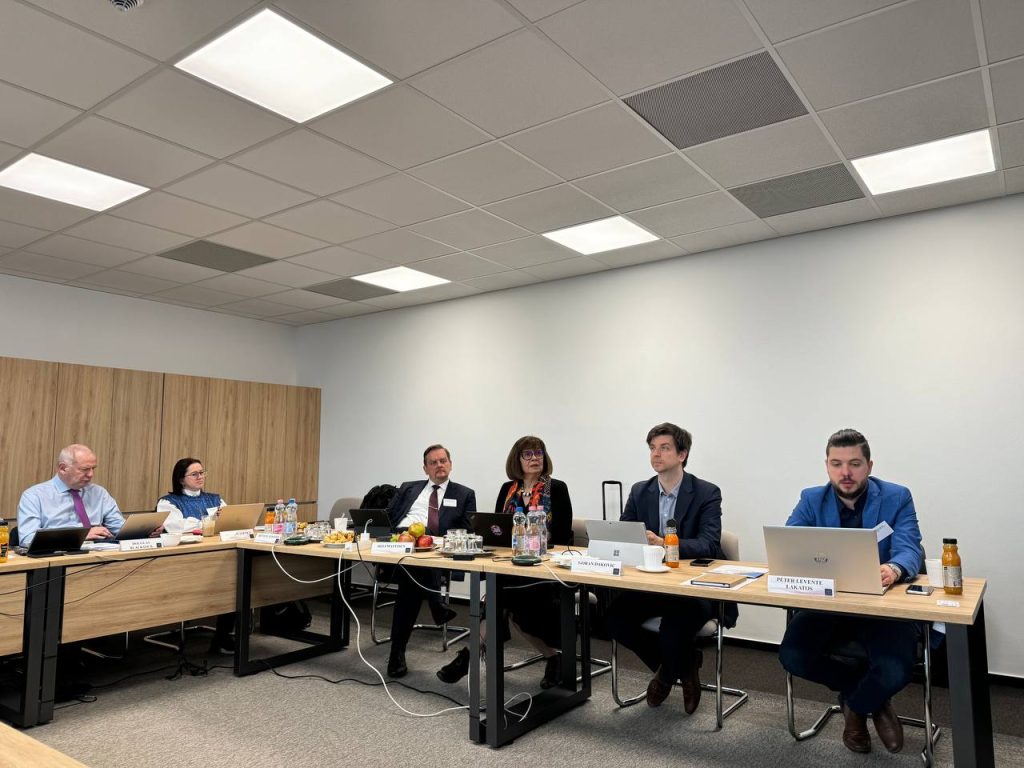
On the second day of the meeting, the participants focused on discussing the principles of NAQA independent operation. They discussed in detail potential challenges in the work, the role and function of the state; the parameters of independence: requirements and expectations, as well as the problems of financial and organisational independence.
Serhii Babak, Head of the Verkhovna Rada Committee on Education, Science and Innovation, spoke about how the full-scale invasion has affected Ukrainian students. Thus, more than a million children have become refugees in other countries, and more than a million and a half have become internally displaced. Nevertheless, over the past year, we have managed to stabilise the work and continue to develop the Ukrainian education system as a whole.
During a session dedicated to the development of the problem of ensuring the agency’s independence, Heli Mattisen, Director of HAKA, shared her experience and presented the concept of HAKA’s activities in Estonia.
A roundtable discussion on post-accreditation monitoring in higher education quality assurance followed. Sergiy Kvit, President of the National University of Kyiv-Mohyla Academy, presented the main tasks and principles of post-accreditation monitoring in Ukraine. He noted that this process is extremely important and involves assessing the implementation of recommendations and taking into account the comments made during the accreditation of educational programmes.
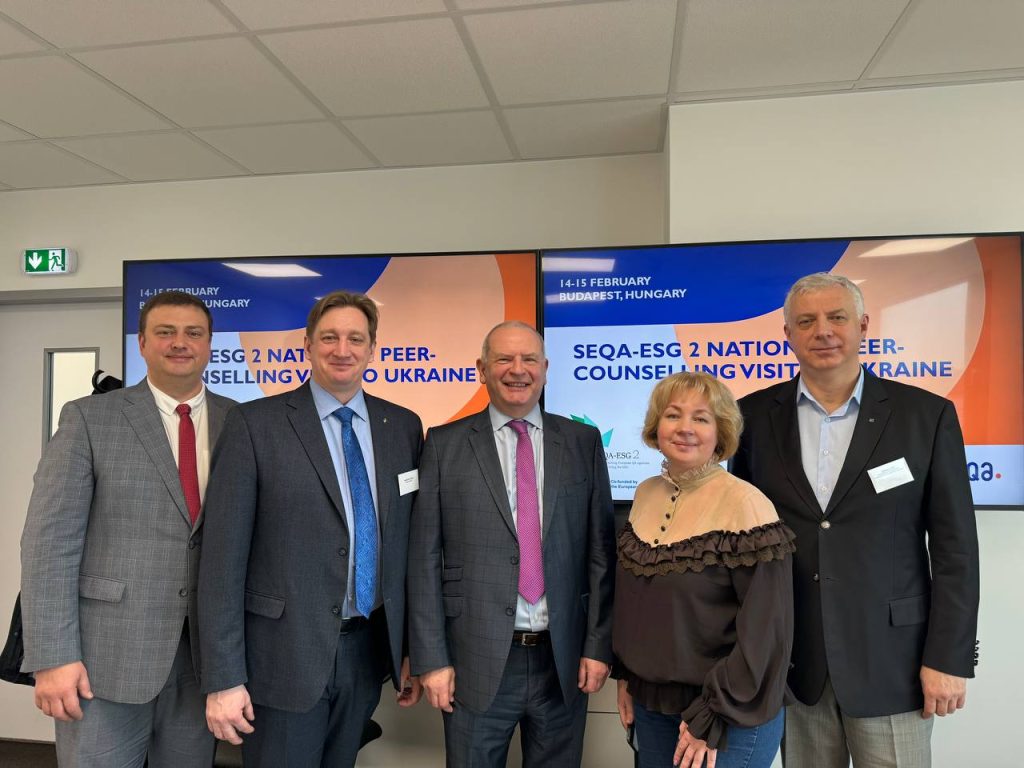
Legislative changes regarding the implementation of post-accreditation monitoring and piloting of new procedures in Ukraine, one-year conditional accreditation, expectations of the European Higher Education Area (EHEA) and best practices of post-accreditation procedures were discussed by Mychailo Wynnyckyj and Nataliia Stukalo, Henning Schäfer, Managing Director of ZEvA, Yurii Kaganov, Vice-Rector for Academic Affairs of Zaporizhzhia National University; Mykola Trehub, Vice-Rector for Perspective Development of Dnipro University of Technology; Oleksii Zhuchenko, Vice-Rector for Academic Affairs of the National Technical University of Ukraine “Igor Sikorsky Kyiv Polytechnic Institute” also joined the discussion.
After that, Oleksandr Khymenko, Head of NAQA Secretariat, spoke about NAQA’s appeals system. He elaborated on the differences between complaints and appeals, the appeal process itself and the right of higher education institutions to appeal decisions on the accreditation of study programmes:
“Complaints and appeals are considered openly and publicly. Complaints can be made both orally and in writing. They are submitted by the participants of the accreditation itself, and written comments are necessarily uploaded to the information and communication system. They are visible throughout the entire appeal process and the relevant decision.”
The two-day event concluded with a discussion of the challenges associated with unconditional recognition of foreign accreditations in accordance with the current regulatory framework of Ukraine and the problems of cross-border accreditation in Ukraine. The participants elaborated on the question of whether it is possible to ensure compliance with national educational standards and legislation based on the results of cross-border accreditation. And what are the achievements of agency cooperation in cross-border quality assurance: challenges and best practices?
NAQA thanks the head representatives and experts of ENQA and EQAR for a detailed and informative meeting, where the Ukrainian delegation received advice and recommendations from European colleagues on further development and approximation to full membership in ENQA and inclusion in EQAR.
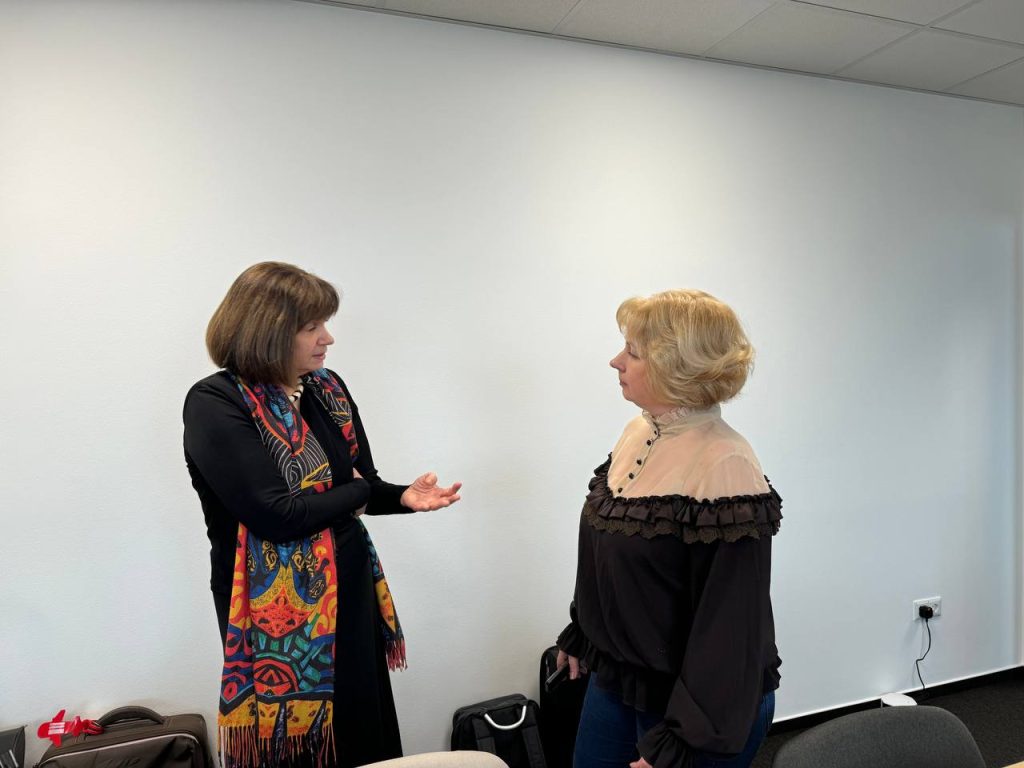
We express our gratitude to all stakeholders, NAQA members and experts from the Advisory Board, and participants who joined the meeting offline and online for their involvement, active position and joint work.
The Ukrainian delegation at the event was represented by:
- Andrii Butenko, NAQA Head
- Sergiy Kvit, President of the National University of Kyiv-Mohyla Academy
- Nataliia Stukalo, Vice Head of NAQA
- Oleksandr Khymenko, Head of NAQA Secretariat

